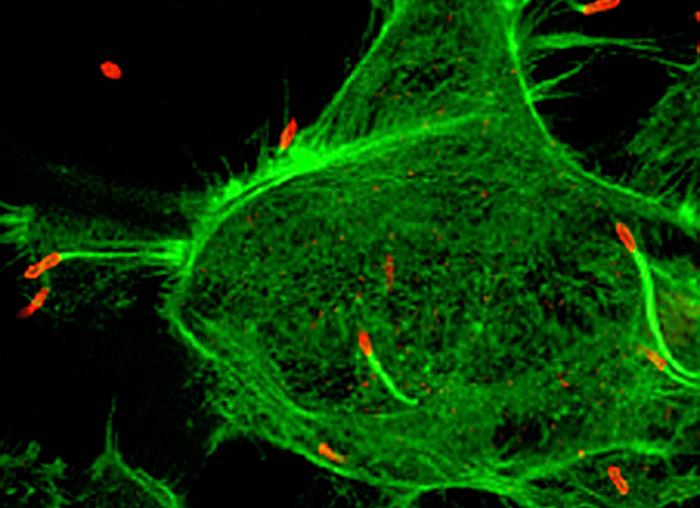In a mouse study, UCLA researchers tested a vaccine against the bacterium that causes melioidosis and found it was highly protective against the disease, which is endemic in many tropical areas, causing approximately 165,000 cases with 89,000 fatalities around the world each year.

Credit: Photo courtesy of Christopher T. French
In a mouse study, UCLA researchers tested a vaccine against the bacterium that causes melioidosis and found it was highly protective against the disease, which is endemic in many tropical areas, causing approximately 165,000 cases with 89,000 fatalities around the world each year.
The bacterium, called Burkholderia pseudomallei, is spread through contact with contaminated soil and water through inhalation, ingestion or broken skin. It is so dangerous that it is categorized as a Tier 1 Select Agent of bioterrorism, and it can cause rapidly fatal pneumonia when inhaled in low doses. If aerosolized and unleashed in a terror attack, it could lead to widespread death.
To date there are no licensed vaccines against the bacterium, said senior author Dr. Marcus Horwitz, Distinguished Professor of Medicine, in the division of infectious diseases, and of Microbiology, Immunology and Molecular Genetics at the David Geffen School of Medicine at UCLA.
“A safe and effective vaccine is needed to prevent this disease as melioidosis is often difficult to diagnose, requires very lengthy treatment lasting three to six months, and has a high fatality rate even in high resource settings,” Horwitz said. “Such a vaccine would be of great benefit to people living in endemic regions, travelers, and military personnel stationed in these areas, and it would also reduce the risk from an intentional release of B. pseudomallei in a bioterrorist attack.”
The study is published in the peer-reviewed journal mBio.
The researchers developed the vaccine using a bacterial vector called LVS ΔcapB as a platform to express highly immunogenic proteins from B. pseudomallei that are able to induce an immune response that later protects the host from illness and death when infected with the pathogen. LVS ΔcapB, derived from a weakened form of a vaccine against tularemia, or “rabbit fever,” had been developed in Horwitz’s lab as a vector platform for creation of vaccines against other diseases caused by Tier 1 Select Agents such as anthrax and plague as well as tularemia.
They administered the new vaccine through both skin injection and intranasal delivery in a strain of mice that is particularly sensitive to B. pseudomallei lung infection. The researchers found that the vaccine was not only safe and non-toxic, but effective even against a highly lethal strain of the melioidosis bacteria. Intranasal administration provided better protection than skin injection, with just a single dose proving effective with long-lasting protection.
The next steps are to test the vaccine for protection against pneumonic melioidosis in a second animal model, which the Food and Drug Administration requires in the case of vaccines for which human efficacy studies cannot be conducted. If it passes that test, the vaccine would then become eligible for testing in humans for safety and immunogenicityS. The researchers will also evaluate the vaccine’s effectiveness against subcutaneous infection with B. pseudomallei, which is the way most cases of melioidosis are thought to be acquired naturally, and test it for efficacy against the closely related Tier 1 Select Agent pathogen Burkholderia mallei, which causes glanders in humans and animals.
Study co-authors are Michael Tullius, Peter Back, Saša Masleša-Galić, and Susana Nava of UCLA, and Richard Bowen of Colorado State University.
The study was funded by the National Institutes of Health (AI141390). Flow cytometry was performed in the UCLA Jonsson Comprehensive Cancer Center (JCCC) and Center for AIDS Research Flow Cytometry Core Facility that is supported by National Institutes of Health awards P30 CA016042 and 5P30 AI028697, and by the JCCC, the UCLA AIDS Institute, the David Geffen School of Medicine at UCLA, the UCLA Chancellor’s Office, and the UCLA Vice Chancellor’s Office of Research.
Journal
mBio
DOI
10.1128/mbio.00186-24
Method of Research
Experimental study
Subject of Research
Animals
Article Title
LVS ΔcapB-vectored multiantigenic melioidosis vaccines protect against lethal respiratory Burkholderia pseudomallei challenge in highly sensitive BALB/c mice
Article Publication Date
21-Mar-2024




